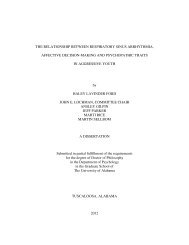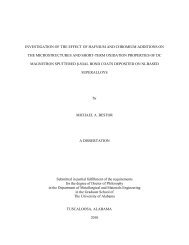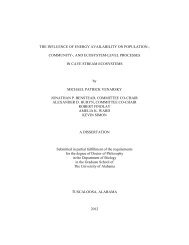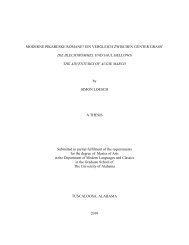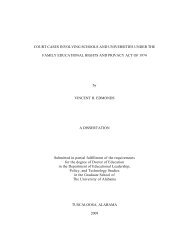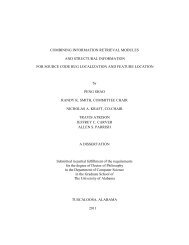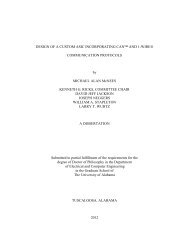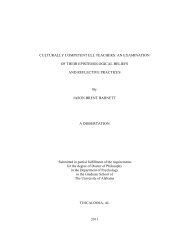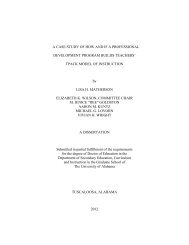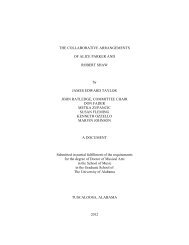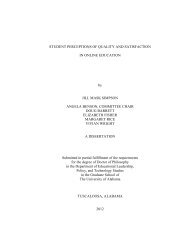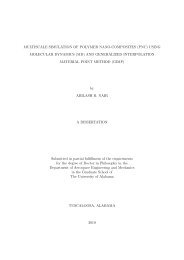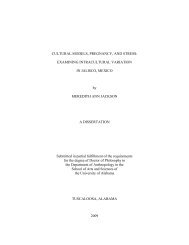- Page 1 and 2:
ADVERSE EMPLOYMENT ACTIONS AND PUBL
- Page 3 and 4:
ABSTRACT The purpose of this resear
- Page 5 and 6:
Finally, I can never express my app
- Page 7 and 8:
III METHODOLOGY ...................
- Page 9 and 10:
V SUMMARY, CONCLUSIONS, AND RECOMME
- Page 11 and 12:
21 District Realignment with Litiga
- Page 13 and 14:
LIST OF FIGURES 1 Creswell’s Data
- Page 15 and 16:
Since 1981, there have been no less
- Page 17 and 18:
Research Questions The research que
- Page 19 and 20:
Affirm: (1) to assert as true or fa
- Page 21 and 22:
Estoppel: (1) a bar to the use of c
- Page 23 and 24:
Transfer: (1) a conveyance of a rig
- Page 25 and 26:
Catchings-Owens, 2000; Harris, 2011
- Page 27 and 28:
administrators very often feel that
- Page 29 and 30:
number of other incendiary titles.
- Page 31 and 32:
significantly beyond those of teach
- Page 33 and 34:
Much like his previous category, Sa
- Page 35 and 36:
indicative of future administrative
- Page 37 and 38:
in improving poor administrators is
- Page 39 and 40:
acknowledge those meetings as notic
- Page 41 and 42:
primary cause for adverse actions w
- Page 43 and 44:
school administrators (Davis, 1998;
- Page 45 and 46:
4. What principles to guide the pra
- Page 47 and 48:
ever emp ploys them. This T alterat
- Page 49 and 50:
First, the researcher collects data
- Page 51 and 52:
Summary In summary, this chapter pr
- Page 53 and 54:
was not maintained at the level tha
- Page 55 and 56:
Dr. Burger and the board to which M
- Page 57 and 58:
eassignment/reassignment of adminis
- Page 59 and 60:
Holding: The court held that § 125
- Page 61 and 62:
Because the finding was affirmed, t
- Page 63 and 64:
Key Facts: Forrest E. Stafford was
- Page 65 and 66:
Key Facts: Joseph Lyznicki was prin
- Page 67 and 68:
Citation: Totten v. Board of Educat
- Page 69 and 70:
performance and withholding the rai
- Page 71 and 72:
Citation: Rossi v. Board of Educati
- Page 73 and 74:
extra time and wages during the lit
- Page 75 and 76:
Holding: The court held that Taylor
- Page 77 and 78:
presented. In the case of Ledew, it
- Page 79 and 80:
SDCL 15-6-52(a) provides the court
- Page 81 and 82:
Issues: (1) Did the board illegally
- Page 83 and 84:
his current or former position. Osb
- Page 85 and 86:
middle school and Grade 9 up to hig
- Page 87 and 88:
Reasoning: The board empowered the
- Page 89 and 90:
and torture” the Harvey’s. This
- Page 91 and 92:
similar position assuming that all
- Page 93 and 94:
Key Facts: During the 1981-1982 sch
- Page 95 and 96:
Disposition: The trial court’s ru
- Page 97 and 98:
Key Facts: Benson was the principal
- Page 99 and 100:
Finally, the cross claim from the d
- Page 101 and 102:
Foster for each month that he worke
- Page 103 and 104:
Roughly two weeks later and after a
- Page 105 and 106:
the composite evidence that all ind
- Page 107 and 108:
halted Bill’s speech at this poin
- Page 109 and 110:
Disposition: The district court rul
- Page 111 and 112:
Following the 1981-1982 school year
- Page 113 and 114:
Reasoning: The court theorized that
- Page 115 and 116:
state board of education. Based on
- Page 117 and 118:
non-renewal for cause was valid. Th
- Page 119 and 120:
earing on his non-renewal. Second,
- Page 121 and 122:
The board further maintained that W
- Page 123 and 124:
As to the award of back pay, the bo
- Page 125 and 126:
documentation of Finance Director M
- Page 127 and 128:
proper hearing was conducted he wou
- Page 129 and 130:
Teachers move to principalships whe
- Page 131 and 132:
senior high school and Gilbert assu
- Page 133 and 134:
Daury put a student in a strangleho
- Page 135 and 136:
school board president, received re
- Page 137 and 138:
to numerous schools as principal an
- Page 139 and 140:
The district court found that Roger
- Page 141 and 142:
(3) Was there sufficient evidence t
- Page 143 and 144:
Reasoning: The court reasoned that
- Page 145 and 146:
Issues: (1) Did Preston Pierce have
- Page 147 and 148:
tenured teacher and assume a teachi
- Page 149 and 150:
Holding: The Missouri Court of Appe
- Page 151 and 152:
employee. Fifth, written notice of
- Page 153 and 154:
1992 Citation: Carrillo v. Rostro,
- Page 155 and 156:
expecting, Terry openly admonished
- Page 157 and 158:
Smith filed in the court of appeals
- Page 159 and 160:
R.C. 3319.02 did not require boards
- Page 161 and 162:
Issues: (1) Despite the sheer bread
- Page 163 and 164:
for rehearing. Holding: The court h
- Page 165 and 166:
current contract. Her contention wa
- Page 167 and 168:
Citation: McCormack v. Maplewood-Ri
- Page 169 and 170:
Finally, McCormack accused M-RHSD w
- Page 171 and 172:
5451. If administrators were provid
- Page 173 and 174:
employment elsewhere to no avail. I
- Page 175 and 176:
Key Facts: Knox, principal of Wingf
- Page 177 and 178:
1998 Citation: Caston School Corpor
- Page 179 and 180:
The search was in direct violation
- Page 181 and 182:
School divided into two separate bu
- Page 183 and 184:
day with recess and lunch duty. She
- Page 185 and 186:
funds. Bradshaw would later issue t
- Page 187 and 188:
Holding: The court held that Downin
- Page 189 and 190:
only board members present with Moy
- Page 191 and 192:
noted that none of these reasons ha
- Page 193 and 194:
American, prior to Black’s reassi
- Page 195 and 196:
questions or concerns regarding sex
- Page 197 and 198:
The board vested the responsibiliti
- Page 199 and 200:
policymaker. The court further gran
- Page 201 and 202:
On April 26, 1999, Graham filed a g
- Page 203 and 204:
Principal’s Performance Review (P
- Page 205 and 206:
Issues: (1) Did the school district
- Page 207 and 208:
way evidentially rebutted the asser
- Page 209 and 210:
placed in Brown’s personnel file,
- Page 211 and 212:
Hinckley argued that she was a more
- Page 213 and 214:
Oliver sued for over $230,000 in co
- Page 215 and 216:
for cause to have been correct and
- Page 217 and 218:
In August, Lassiter met with Sawyer
- Page 219 and 220:
Everson relied on the point that sh
- Page 221 and 222:
Reasoning: First, it is of importan
- Page 223 and 224:
Reasoning: First, R.C. 3319.11(B) r
- Page 225 and 226:
school computer during school hours
- Page 227 and 228:
no evidence greater than hearsay. M
- Page 229 and 230:
Issues: (1) Did Patten suffer from
- Page 231 and 232:
Reasoning: The board did terminate
- Page 233 and 234:
clique because of her race. The dis
- Page 235 and 236:
Specifically, the court noted that
- Page 237 and 238:
improved the rating to letter C. Ho
- Page 239 and 240:
D’Angelo’s associational claim
- Page 241 and 242:
Next, Sanders argued that she had b
- Page 243 and 244:
Issues: (1) Did Fiero suffer First
- Page 245 and 246:
Holding: The court held that Moore
- Page 247 and 248:
The first incident occurred in a cl
- Page 249 and 250:
oard elected to reassign Herrera to
- Page 251 and 252:
Key Facts: In December of 2001, Her
- Page 253 and 254:
In February 2006, Gepford visited M
- Page 255 and 256:
current case had to be strikingly s
- Page 257 and 258:
also. Following the enactment of th
- Page 259 and 260:
2010 Citation: McFerren v. Farrell
- Page 261 and 262:
Third, the court deduced that McFer
- Page 263 and 264:
during the 2006-2007 school year he
- Page 265 and 266:
Family Medical Leave Act (FMLA). De
- Page 267 and 268:
actions regarding financial matters
- Page 269 and 270:
manager. In December 2006, Soroka c
- Page 271 and 272:
y sufficient evidence, and that Cor
- Page 273 and 274:
they placed Heutzenroeder on perfor
- Page 275 and 276:
further clarified that Heutzenroede
- Page 277 and 278:
traffic stops with females. Flores
- Page 279 and 280:
teacher, Flores was unable to conne
- Page 281 and 282:
The latter event was of a more seri
- Page 283 and 284:
action because Herbert suffered a
- Page 285 and 286:
quantitative breakdown of the infor
- Page 287 and 288:
Case Year State Action PP Litigativ
- Page 289 and 290:
Case Year State Action PP Litigativ
- Page 291 and 292:
Case Year State Action PP Litigativ
- Page 293 and 294:
Case Year State Action PP Litigativ
- Page 295 and 296:
Case Year State Action PP Litigativ
- Page 297 and 298:
Case Year State Action PP Litigativ
- Page 299 and 300:
Case Year State Action PP Desoto Co
- Page 301 and 302:
Case Year State Action PP Brandt v.
- Page 303 and 304:
Of the five cases, two common threa
- Page 305 and 306:
Case Year State Action PP Martinek
- Page 307 and 308:
each of these cases, the school sys
- Page 309 and 310:
eassignment cases were tied to empl
- Page 311 and 312:
Case Year State Action PP Patten v.
- Page 313 and 314:
Case Year State Action PP Sweeney v
- Page 315 and 316:
Administrators in 7 of the 19 cases
- Page 317 and 318:
Table 11 Prevailing Party--Employee
- Page 319 and 320:
Table 12 Prevailing Party--School C
- Page 321 and 322:
documentation of employee actions s
- Page 323 and 324:
Table 13 State Count Master Case Ye
- Page 325 and 326:
Case Year State Action PP O’Dea v
- Page 327 and 328:
Table 15 State Count--Pennsylvania
- Page 329 and 330:
argument failed because New York on
- Page 331 and 332: Case Year State Action PP Litigativ
- Page 333 and 334: In Williams v. Seattle School Distr
- Page 335 and 336: had employed the administrator with
- Page 337 and 338: Three other cases were split in par
- Page 339 and 340: Table 22 District Realignment--Sala
- Page 341 and 342: Table 24 Constructive Discharges wi
- Page 343 and 344: Table 26 Constructive Discharges--I
- Page 345 and 346: Case Year State Action PP Litigativ
- Page 347 and 348: In Reed v. Rolla 31 Public School D
- Page 349 and 350: Case Year State Action PP Litigativ
- Page 351 and 352: Case Year State Action PP Litigativ
- Page 353 and 354: Case Year State Action PP Litigativ
- Page 355 and 356: eceived numerous warnings over exte
- Page 357 and 358: physical altercation with a student
- Page 359 and 360: Table 34 Failed Leadership--Insubor
- Page 361 and 362: Table 35 Failed Leadership--Incompe
- Page 363 and 364: falsification of documents (2), per
- Page 365 and 366: Case Year State Action PP Litigativ
- Page 367 and 368: Outlandish behaviors--physical alte
- Page 369 and 370: Rabon v. Bryan County Board of Educ
- Page 371 and 372: Kirschling v. Lake Forest School Di
- Page 373 and 374: Case Year State Action PP Litigativ
- Page 375 and 376: This category reiterated the middle
- Page 377 and 378: intelligence. However, dissent over
- Page 379 and 380: Two cases displayed strife between
- Page 381: skills are of the utmost importance
- Page 385 and 386: Case Year State Action PP Litigativ
- Page 387 and 388: Case Year State Action PP Litigativ
- Page 389 and 390: As it was noted before, five issues
- Page 391 and 392: It was explained earlier that the o
- Page 393 and 394: administrators violated due process
- Page 395 and 396: In Snipes v. McAndrew, (1984 S.C.),
- Page 397 and 398: Case Year State Action PP Litigativ
- Page 399 and 400: speech is not protected by the Firs
- Page 401 and 402: In Lewis v. Harrison School Distric
- Page 403 and 404: Case Year State Action PP Litigativ
- Page 405 and 406: statutes in Klein v. Board of Educa
- Page 407 and 408: eassigned, which was allowed per th
- Page 409 and 410: Case Year State Action PP Litigativ
- Page 411 and 412: Botti claimed that he was never pro
- Page 413 and 414: CHAPTER V SUMMARY, CONCLUSIONS, AND
- Page 415 and 416: had been either incorrectly carried
- Page 417 and 418: First, in racial discrimination cla
- Page 419 and 420: Fourth, insubordination was the nex
- Page 421 and 422: have to be an act; it could simply
- Page 423 and 424: failure to inform administrators in
- Page 425 and 426: Outcomes--Identifying Information 2
- Page 427 and 428: Outlandish behavior. Of the 18 outl
- Page 429 and 430: There was a case upswing beginning
- Page 431 and 432: present in these cases with demotio
- Page 433 and 434:
supposed insulated speech. The adve
- Page 435 and 436:
4. An administrator who possesses t
- Page 437 and 438:
17. District-level administrators f
- Page 439 and 440:
29. A district/board’s proffered
- Page 441 and 442:
Second, Sacken (1996) and Davis (19
- Page 443 and 444:
REFERENCES Cambron-McCabe, N. H., M
- Page 445:
Price, H. (2010). Does No Child Lef



